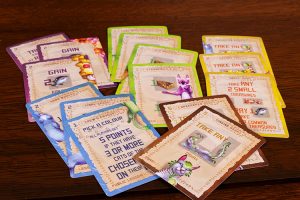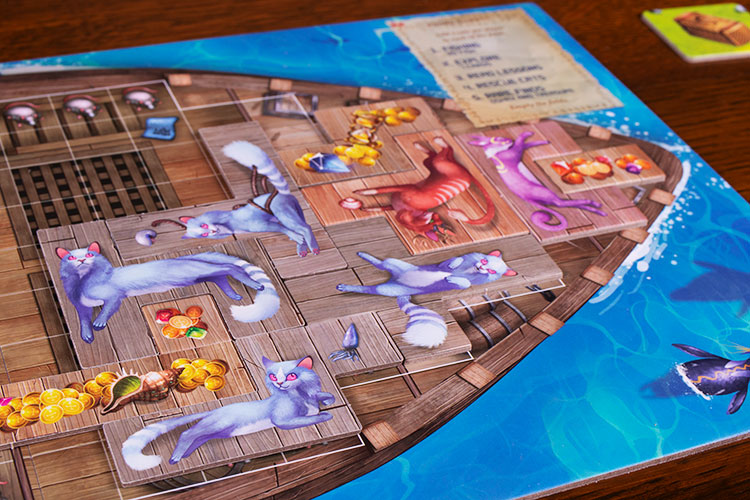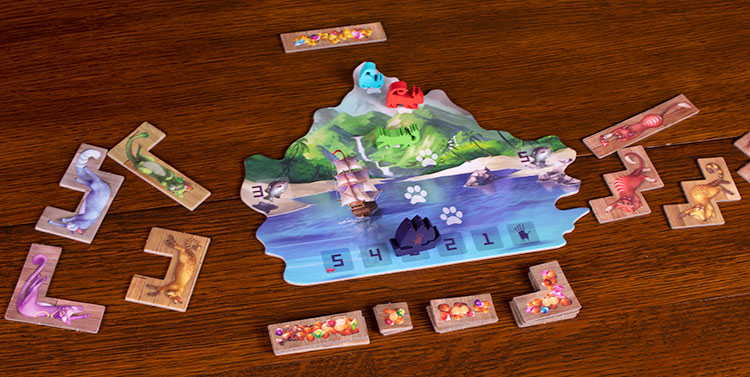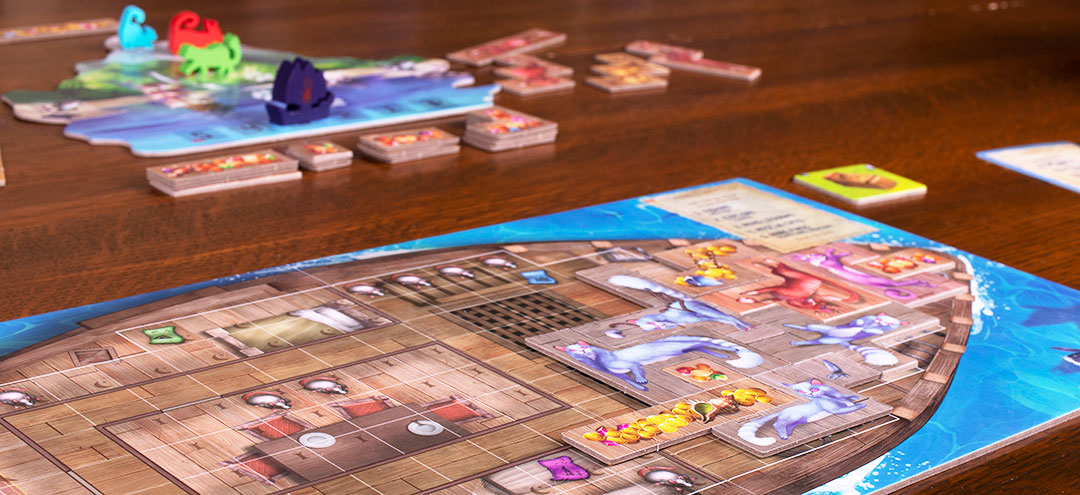 One of the trends in board gaming lately has been the use of polyominos. These Tetris-style pieces have been seen in games about bears, quilting, and even Viking conquest. Today, you’ll be embarking on a wooden sailing ship to rescue polyomino shaped cats in the Isle of Cats from The City of Games. So, grab your wicker baskets and piles of fish as we check out this new tile-laying game.
One of the trends in board gaming lately has been the use of polyominos. These Tetris-style pieces have been seen in games about bears, quilting, and even Viking conquest. Today, you’ll be embarking on a wooden sailing ship to rescue polyomino shaped cats in the Isle of Cats from The City of Games. So, grab your wicker baskets and piles of fish as we check out this new tile-laying game.
The Isle of Cats is a tile-laying, card drafting game for 1-4 players that takes about 60 minutes to play.
Gameplay Overview:
The Isle of Cats is played over five rounds, each of which has a few different phases. Each round starts with players gaining 20 fish tokens, the game’s currency. Then players are each dealt a hand of 7 cards which are drafted in the pick and pass 7 Wonders style mechanic. Cards come in a few different types:
- Baskets and speed: used to rescue cats and determine initiative order
- Lesson cards: public and private end game goals
- Rare Finds: Claim rare and common treasures
- Action cards: let players break the rules in a variety of ways

After players have drafted their seven cards, they must decide which they want to keep, paying their cost in fish. The round then steps through a few more phases of playing cards in a specific order, but the main part has players rescuing cats from the island. In turn order, a player can rescue a cat from the left side of the island for 3 fish, or the right side for 5 fish. In either case the player must also spend a basket card to do so.
Cats rescued must immediately be placed on the player’s ship. After the first cat, all subsequent cats must be played adjacent to a previously played one. The goal is to group cats of the same color together for more points, to cover rats on your ship (negative VPs), and to fill up rooms.
The game ends at the end of the fifth round. Players earn points for families of cats, lesson cards, rare treasures, and lose points for unfilled rooms and rats left on the ship. Most points wins.

Game Experience:
While Isle of Cats isn’t a wholly unique game—it borrows concepts from many other games—it does blend them seamlessly together into a really fun play experience. Throughout the game there a lot to do and plenty of interesting decisions to make. This all starts with the card draft each round.

There is quite a large deck of cards in The Isle of Cats, so don’t expect to see all of them in each game. Yet even with this large deck, there are really only a few types of cards, so it doesn’t make explaining the game any harder. Green cards help you catch cats and determine turn order, blue cards are end game scoring, purple action cards, and brown/gold give you bonus tiles. Easy peasy.
And since cards must be obtained by spending fish, this requires players to decide how much they want to spend on cards each round, and balance that with how many cats they want to rescue. You may want to keep your whole hand of cards, but that will cost you probably 75% of your fish for the round, leaving you with only 1 or 2 cats you can save. And that’s assuming you even have enough baskets. Players start with one and must use cards to catch more than one cat each round.

And you will want to catch as many cats as you can, because that’s how you are going to score the lion’s share of your points. Getting large families is not only lucrative but helps avoid some of the negative victory points. You most likely won’t be able to fill all your rooms (especially the big one), but if you can fill up even half of them, that will save you some solid points. Speaking of rooms, I do wish the rooms were a bit clearer. While the game does use patterns in a few spaces, at times it’s a bit too subtle for my tastes.
While Isle of Cats is a light to medium weight game, I should also mention that it does include a family ruleset for those interested. This version removes most all the cards and the fish tokens. Players simply draft cats each round to fill up their ship and each player will have 2 secret lesson cards for end game points. It’s a nice mode for playing with young ones or non-gamer friends.

Final Thoughts:
Overall I was impressed with The Isle of Cats. It has some really nice production values, a highly accessible ruleset, and some solid replay value. The game is full of interesting decisions to make throughout as players will need to decide not only which cards to draft, but how best to budget their fish each round. While the mechanics in The Isle of Cats aren’t wholly unique, they all mesh together nicely in an excellent light-medium weight euro game.
Final Score: 4 Stars – Solid offering that not only has great production values but can be played with a wide range of players.
 Hits:
Hits:
• Easy to learn
• Great production values
• Solid replay value
• Interesting decisions to make
Misses:
• The room divisions could be clearer
























Nice review. I’ve been delaying picking this up because of the glut in polyomino games. However, you’ve just about convinced me to give this one a try. I have both a family gaming group and a heavy euro group, so this just might fit in. Thanks.
Great! hope you enjoy it. 🙂